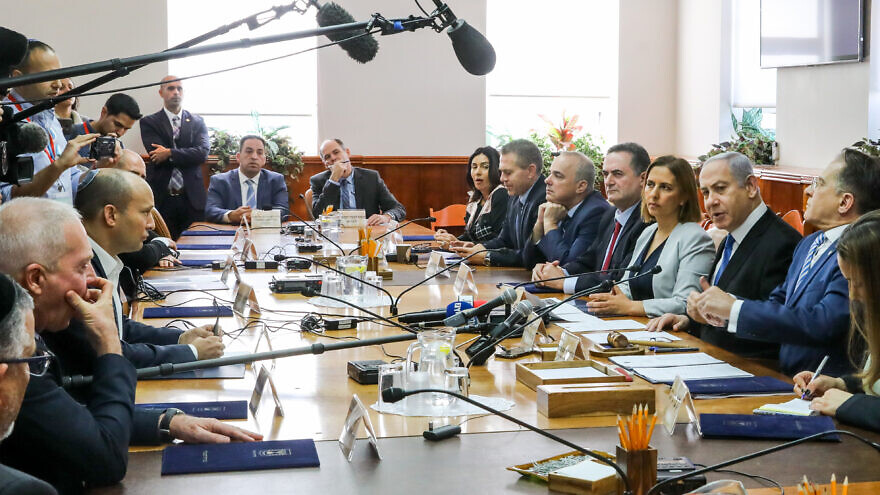After decades in which the Israeli government has lacked a formal, written national security strategy, the time has come for future decision-makers to be equipped with such guidelines, the co-author of a new strategy document has told JNS.
Former Israel Defense Forces Chief of Staff, Lt. Gen. Gadi Eizenkot, and Prof. Col. (res.) Gabi Siboni, who heads the Program on Military and Strategic Affairs at the Institute for National Security Studies (INSS) in Tel Aviv, recently issued the “Guidelines for Israel’s national security strategy.”
The document was published at the Washington Institute for Near East Policy and at the INSS. The aim now is to spark a public discourse and get future governments to adopt formal guidelines, said Siboni.
Efforts to promote the document have been made more difficult by the lack of any functioning government and the current political crisis that has paralyzed the Knesset.
For years, Israeli governments and cabinets have made strategic decisions without formal principles on how to conduct national security efforts, including the use of military power. Yet continuing to function in this way would be “irresponsible,” argued Siboni.
“This led us to publicize the document. We want the State of Israel to have a guiding security strategy. We put forward a methodology. This can also further, by becoming legally binding for every government, if the Knesset votes in favor of that,” he stated.

The document lays out, in an organized manner, the state’s top objectives, its priorities and interests. It outlines how Israel’s security establishment will function during periods of calm, emergencies and war.
It also formulates a third layer as an addition to the two known layers of preparing for war and going to war. The additional layer is the low-profile, ongoing campaign to damage the force buildup of Israel’s enemies and improve Israel’s ability to gain victory in future war. This layer is known among military planners as the “Campaign Between Wars.”
“If in the past, one would prepare for war or be at war, but now there is the ‘Campaign Between Wars,’ ” said Siboni. “There are the combat operations during routine times. They safeguard deterrence. We offered a way of formalizing these activities within the overall national security efforts.”
When it comes to entering states of general conflict, the document lists concrete reasons that could justify a war. “What do we go to war for? We suggested new concepts here,” said Siboni.
The document notes that the main changes in the security environment stem from Iran’s attempt at becoming a regional hegemon, its efforts to acquire a nuclear weapons and Tehran’s construction of a zone of influence that includes Yemen, Iraq, Syria, Lebanon and the Gaza Strip.
“There are a number of threat elements, ranging from the sub-conventional—terror organizations and non-state actors—to conventional, which are state armies. There is also the unconventional threat level—nuclear, biological, and chemical weapons—and a fourth threat level—the cyber environment. We analyzed these threats,” stated Siboni. “From there, we built scenarios of what Israel will need to deal with—not just today, but a wider look at the future of the threats. We looked at ways of strengthening national security. This requires putting various efforts together.”
Tackling the cracks in internal cohesion
The document also tracks Israel’s changing internal environment. It notes the country’s growing population, and its economic, scientific and technological power, but also, the worrying cracks that are developing in national cohesion.
“One of the key insights is that the power of Israel comes from the cohesion of its society,” noted Siboni. “Without that, we have nothing. This cohesion must be fostered, as part of the effort to boost security.”
The authors proposed a framework of security-boosting principles that cover the military world but are not limited to it.
“We took into consideration the critical need to safeguard the people’s army [mandatory conscription] model, and the need to get rid of ideas like having a small professional military,” said Siboni. “We also propose that the service is seen as a value in itself. Everyone should serve—some in the military, others in national civilian programs.”
Service programs should be set up to meet the needs of haredi youths and Israeli-Arab youths, he added.
“The people’s army model is the national provision for big emergencies,” he stressed.
In addition, the document states that national security is directly tied to Israel’s special strategic relationship with the United States. It describes the U.S. alliance as “a cornerstone of the overall Israeli effort to attain national security by political means.”
The related goals of combating delegitimization efforts also require a comprehensive strategy, as well as cooperation with parties in the international community and in the Jewish Diaspora, the document says.
“Alongside this, Israel must strengthen its bond with Diaspora Jews. Israel’s role as the national home of the Jewish people is and has always been dependent on the mutual relationship and support between the state and the Jewish Diaspora. This connection is a pillar of Israel’s national security and is reflected in its national values and raison d’être,” wrote the authors.
“We described the linkage with the U.S., and with the Jewish Diaspora, as vital and powerful,” said Siboni. “If Israel once relied on the Diaspora, today the tables have turned, and Israel must think of how it supports the Diaspora Jewish communities.”
Such efforts must combat the major erosion underway to the Jewish identity in sections of overseas communities, and ways of strengthening bonds to Israel, the document said, listing such processes as having a tangible influence on national security.


























